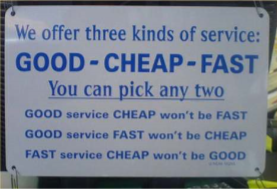 Do you want a lover, or do you want a life?
Do you want a lover, or do you want a life?
One hand or the other, the butter or the bread knife?
Do you choose winter, spring, summer, or fall?
It’s driving me crazy that I can’t have it all –
Can’t Have It All by Jay Brannan, 2009
In the sales/marketing world, your prospects and customers want products and services that are: Better; Faster; and Cheaper. I hate to break the news to them, but although competition always requires you to do more; they can’t have all three.
Better
– Most customers demand quality, and continue to raise the “quality bar”, year after year. Most understand the axiom that you generally get what you pay for, but buyers don’t necessarily plan to pay for it.
Faster
– I don’t have to tell you how enamored customers are today with speed. Faster performing products and services, faster delivery, and of course, faster service after the sale. You should realize that all of these areas of speed come with a price, but most of the time your customers just “expect” everything to be faster, and again don’t have any intention of paying for it.
Cheaper
– Every buyer you deal with wants to spend less for what they get. When was the last time one of your buyers told you they understood what you’re up against as a supplier, and agreed to pay more? I see you smiling!
————————-Recommended Link——————————————————————
If you are like most sales managers, you’re really sad that there is not a college degree available in common sense face-to-face communication skills for salespeople. But there is a next best thing. Check it out here, and you will discover there is still hope for your sales folks.
————————————————————————————————————
Here’s the thing. Your buyers may possibly get two of the above, but just not all three. If they demand quality, it’s possible to get that, and even faster (in certain industries), but not cheaper. Things may be faster and cheaper, or faster and better, but not all three. Quit frustrating yourself, and stick to your guns. Keep doing what you do best and you’ll be fine in the long run.
Let’s use an example from the services industry, where I have a lot of experience. You have to give up at least one of these areas to fuel the other two. Let’s use a plumber as an example:
The Better-Faster plumber:
He does the best work in town, and can get it done on short notice. He doesn’t need to compete on price, because the people want his service will pay a premium (either for his speed or for his expertise).
The Faster-Cheaper plumber:
Too many people compete in this arena. Fast and cheap rarely result in high quality work. To be cheap, a service organization generally has to give up on either material quality or the skill of the person doing the work.
The Better-Cheaper plumber:
This seems like a rarity….and it is. Few true businesses operate in this space for long, because they figure out that they can ask for more money than what they are getting now. Because they are doing better work for a cheaper price, it should be expected that you’ll wait longer for the finished product. Example: The roofer who is moonlighting from his normal job under the table to do your job on the weekend; he’s not going out of the way to get your roof done ASAP.
Does that mean that all companies should focus on being “Better-Faster”? No. But, a company CAN focus on a single area in order to differentiate, and could be the backbone of that company’s strategy.
The Better plumber:
He acknowledges to his clients that he sells quality, and might use products that require a longer order lead time. He takes time to do his due diligences while preparing his proposals, and forms a relationship with his client. This process takes longer, and the contractor doesn’t budge on his pricing.
The Faster plumber:
He uses products that he can get quickly, so his product offering will be limited to current availability from his suppliers. Since
relationships are not the focus of his business, clients are left with a feeling of organized chaos, due to the plumber spending so little time at the house. The price might be lower, but the client is left with a feeling of buyer’s remorse, hoping that none of
the lines rupture when the water is turned back on.
The Cheaper plumber:
The products used by this guy are lower quality and installed by workers with limited experience. The experienced employees are stretched thin on time and resources, trying to get as much work done as possible. The cost is less, but the client is not given other quality indicators to reassure them of their decision.
Since your customers can’t have it all, your company must decide what it wants to be known for, and must then market itself in that direction. Are you going to be better, faster, or cheaper?
©2014 Robinson Training Solutions, LLC


